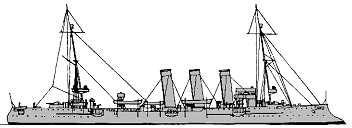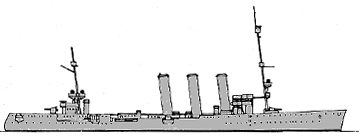

München 1905

Berlin 1928
| Name | No | Yard No | Builder | Laid down | Launched | Comp | Fate |
| Bremen | 135 | Weser, Bremen | 1902 | 9.7.1903 | 19.5.1904 | sunk 17.2.1915 | |
| Hamburg | 258 | Vulcan, Stettin | 1902 | 25.7.1903 | 8.3.1904 | accommodation ship 1918-1920, stricken 3.1931 | |
| Berlin | KW Danzig | 1902 | 22.9.1903 | 4.4.1905 | hulk 1935 | ||
| Lübeck | 260 | Vulcan, Stettin | 1903 | 26.3.1904 | 26.4.1905 | target ship 1917 | |
| München | 138 | Weser, Bremen | 1903 | 30.4.1904 | 10.1.1905 | accommodation ship 1918 | |
| Leipzig | 143 | Weser, Bremen | 1904 | 21.3.1905 | 20.4.1906 | sunk 8.12.1914 | |
| Danzig | KW Danzig | 1904 | 23.9.1905 | 1.2.1907 | stricken 11.1919 |
|
Displacement normal, t |
3278 Lübeck: 3265 |
|
Displacement full, t |
3651 - 3816 Lübeck: 3661 |
|
Length, m |
110.6 wl 111.1 oa |
|
Breadth, m |
13.3 |
|
Draught, m |
5.38 - 5.60 |
|
No of shafts |
2 |
|
Machinery |
2 VTE, 10 Marine boilers Lübeck: 2 Parsons steam turbines, 10 Marine boilers |
|
Power, h. p. |
11750 Lübeck: 14400 |
|
Max speed, kts |
23 |
|
Fuel, t |
coal 860 |
|
Endurance, nm(kts) |
Bremen, Hamburg, Berlin: 4270(12) Lübeck: 3800(12) München, Leipzig, Danzig: 4690(12) |
|
Armour, mm |
steel / Krupp steel - deck: 35 - 20, slopes: 80 - 50, glacises: 100, CT: 100, shields: 50 |
|
Armament |
Bremen, Hamburg, Berlin: 10 x 1 - 105/37 SK L/40 C/97, 2 - 450 TT (5, beam) Lübeck, München, Leipzig, Danzig: 10 x 1 - 105/37 SK L/40 C/04, 2 - 450 TT (5, beam) |
|
Complement |
288 |
Project history: Having hit on a very satisfactory light cruiser design with the Gazelles the German Navy merely enlarged it and gave it more power and speed to produce the Bremens, the first class to adopt the city names which were henceforward to be standard. The main appearance difference was that the new class had three instead of two funnels. They also had a thicker deck. As a very sensible experimental move, Lübeck, otherwise identical to her sisters, was given the first turbine plant used by the German Navy, thus enabling successful comparative trials to be run. In an attempt to convert the high speed of rotation of the turbines to power, the Lübeck was originally fitted with four separate propellers on each shaft, though this number was later cut down to two.
Ship protection: 35mm protective deck with 80-50mm slopes protected machinery, outside machine spaces 20mm deck had turtleback form. Engines had 100mm glacises. CT had 100mm sides and 20mm roof, guns had 50mm shields.
Modernizations: 1915, Bremen: - 4 x 1 - 105/37; + 2 x 1 - 149/42 SK L/45 C/09
1915, Berlin: + 80 mines
1916, Lübeck: - 4 x 1 - 105/37, 2 - 450 TT; + 2 x 1 - 149/42 SK L/45 C/09, 2 x 1 - 500 TT (4), 50 mines
1916, Berlin, Műnchen: were disarmed
1916, Hamburg: - 4 x 1 - 105/37
1920, Hamburg: was armed with 10 x 1 - 105/42 SK C/06, 2 x 1 - 500 TT
1922, Berlin: was armed with 8 x 1 - 105/42 SK C/06, 2 x 1 - 500 TT, stem was reconstructed (length was 110.6m wl and 113.8m oa)
Naval service: Leipzig was a part of Spee squadron, she was sunk 8.12.1914 off Falklands by artillery of British cruisers Cornwall and Glasgow. Bremen was sunk in Northern Baltic by British submarine E9 (on other data stricken by Russian mines). Remaining ships participated in operations a little as were considered poorly armed and insufficiently fast.
© Ivan Gogin, 2008-14